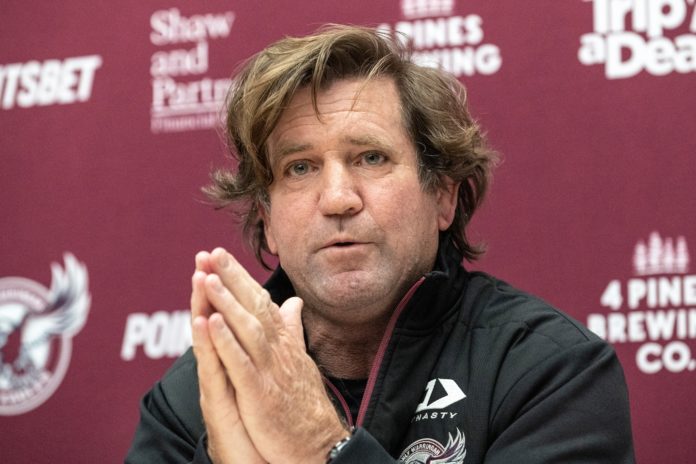
While the jerseys were soon celebrated by LGBTQ advocates, they were just as quickly rebuked by conservatives who derided the involvement of “politics” in sports. The seven players cited cultural and religious grounds for their decision to boycott the Thursday game in which the Pride jersey will be worn, according to the Sydney Morning Herald. The Sea Eagles are ranked ninth in the National Rugby League, one spot below the Roosters.
Sea Eagles coach Des Hasler apologized Tuesday for “a significant mistake” in how the plan for the jerseys was executed, saying there was “little consultation” with those involved, including the players.
The intent of the jerseys, he said, was to “represent diversity and inclusion for all, utilizing the symbolic colors of Pride to embrace all groups who feel marginalized or face discrimination.”
Instead, the plan has “caused significant confusion, discomfort and pain for many people,” he said. Hasler apologized to the LGBTQ community, as well as to the players, saying, “We accept your cultural beliefs and hope you can accept our apology.”
Jioji Ravulo, a professor of social work and policy studies at the University of Sydney and a person of Fijian Indigenous heritage, wrote in an op-ed for the Age that six of the seven players refusing to wear the Pride jersey are from a Pasifika heritage — an Indigenous term encompassing many Pacific Islander communities.
In a phone interview, he said nearly half of the players in the National Rugby League were of Pasifika heritage, and a “large proportion” of Pasifika people are Evangelical Christians.
“Staunch views on sexuality are based on conservative family values that are paralleled with the Christian faith,” Ravulo said. “These views didn’t exist in Pasifika cultures before colonization.”
Homophobia, he said, “was taught to us by White, Western views brought to us by colonization and the Christian church.”
He said the “demonization of the queer community” was not historically a Pasifika ideal, but rather, “it’s homophobia in the context of the broader Evangelical church.” In many Pasifika communities, church is not just about religion, but a place to “connect recreationally and socially,” he added.
Ian Roberts, a former player for the Sea Eagles who is openly gay, wrote in a Sydney Morning Herald column that he was “trying not to be angry.” He said the “intentions were good” behind the effort to wear the rainbow jerseys, and he thanked Hasler, who Roberts said was supportive of him when he came out.
Addressing the players who refused to wear the jersey, he wrote: “I am trying to understand your position. I ask you to understand mine, and that of the gay community.”
“We were born gay,” Roberts said. “We had no choice in the matter. It is your right to pursue whatever faith you like. But if your belief is that we have made the wrong choices in life, because we chose to be gay, then you are simply wrong.”
He also pointed out that homophobia has led to suicides among LGBTQ teens and children. LGBTQ Australians between 16 and 27 years old are five more times likely than the general population to have attempted suicide, according to LGBTIQ+ Health Australia.
Keegan Hirst, who came out as gay while he was a professional rugby player in Britain, wrote on Twitter that he would be honored to wear the Sea Eagles’ Pride jersey. “As should all your players,” he wrote, tagging the club. “Shame on the ones who aren’t.”
“I feel like it’s just homophobia hiding behind religion,” Hirst said in an interview on Britain’s Sky Sports, “because there are plenty of people who are religious who are not homophobic.”
Warren Smith, a commentator on Fox Sports Australia, tweeted: “Imagine, in 2022, having to apologize for wanting to promote inclusiveness and diversity.”






